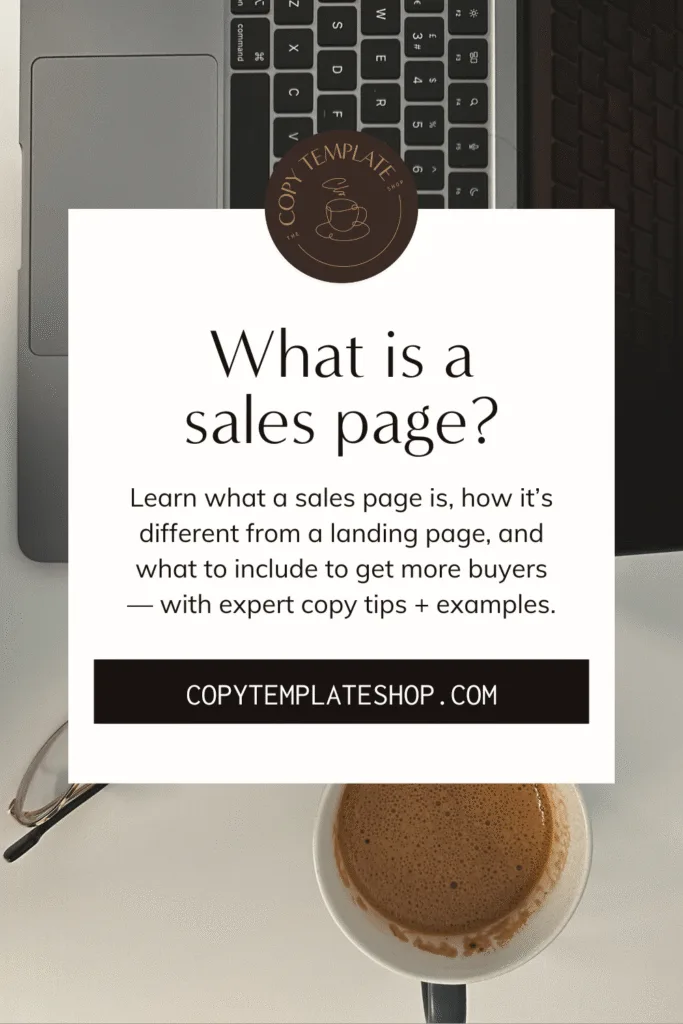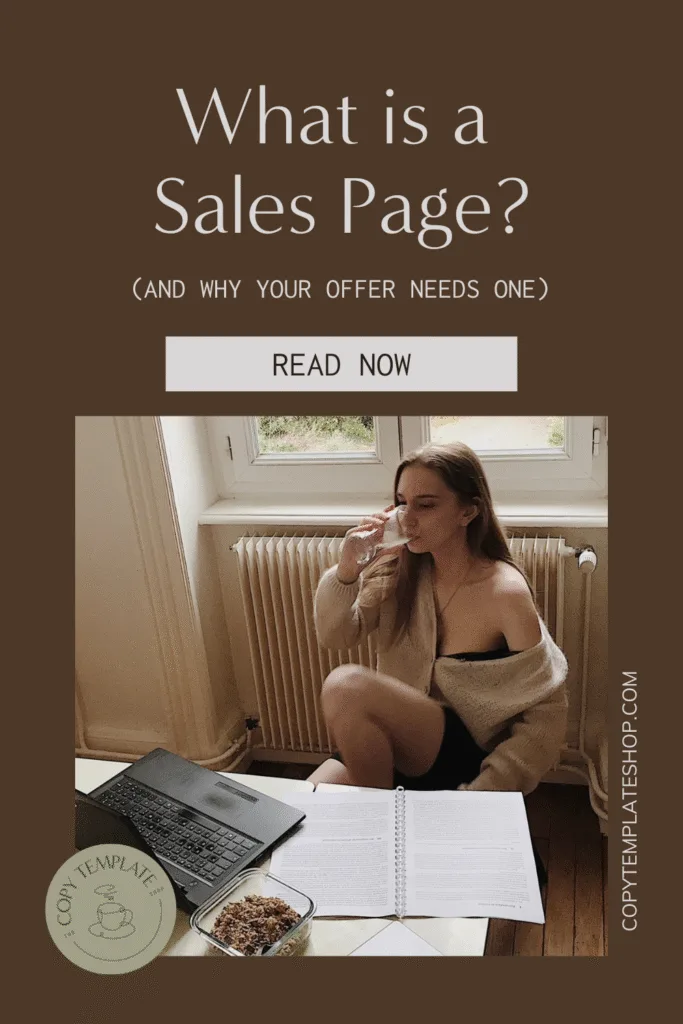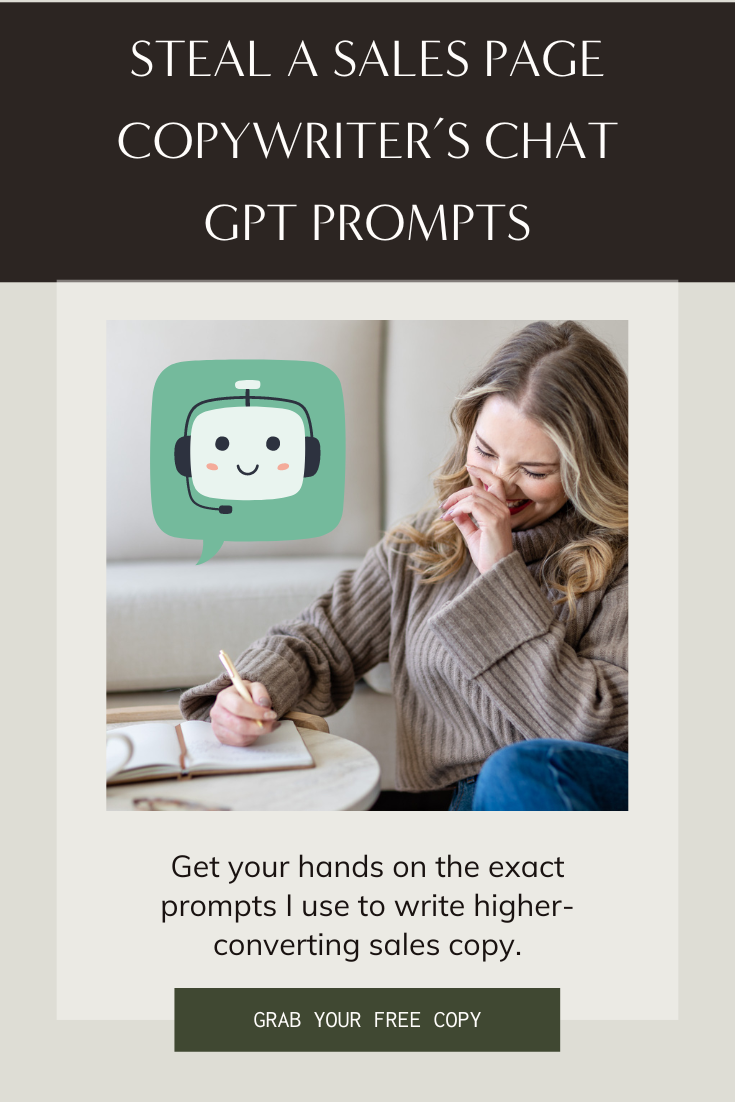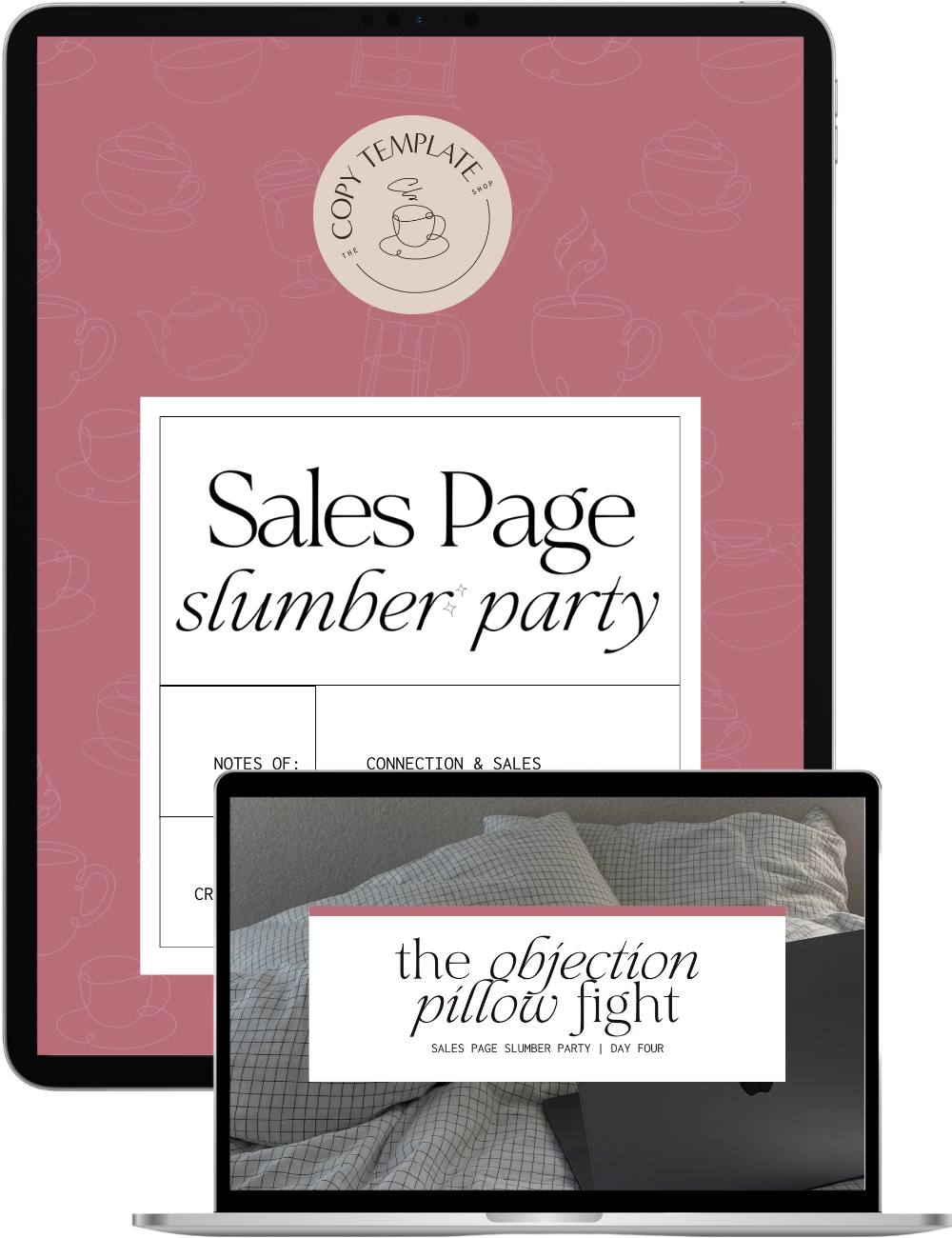When you’re promoting any offer online — a course, a service, a digital product — there’s one powerful piece of copy that can make all the difference between it sitting on a virtual shelf gathering dust and actually getting it in the hands of buyers: your sales page.
But what is a sales page exactly? How is it different from a landing page, and do you really need one?
As a professional copywriter with nearly a decade of experience, I’ll walk you through the need-to-know information — plus some tips on what to include on your sales page, why each piece matters, and how to make yours as effective as possible.
Sales Page vs Landing Page — What’s the Difference?
A sales page is a dedicated page on your website with a singular, clear goal: selling your offer.
Think of it as your personal virtual salesperson, working for you 24/7 to connect with your ideal clients, build trust, and guide them towards that confident “yes.”
A landing page, on the other hand, is usually designed merely to inform or to generate leads (like collecting email addresses or getting webinar signups).
Both have a place in your online business, but a sales page should really focus on telling the story of your offer: why it exists, who it’s for, what results it delivers, and (most importantly) how someone can buy it.
Why Sales Pages Matter in Online Business
Wondering if you really need a full sales page to sell your offer?
While it’s totally possible to sell your offers through social media, email, or direct messages (DMs) alone, most online offers need a little more explanation than those mediums allow for.
Having a well-written sales page makes selling your offers a heck of a lot easier — and it can easily become your most powerful conversion tool.
Here’s why we recommend a sales page for each offer:
Connect With Your Audience
Imagine being able to have a one-on-one conversation with each potential buyer. Well, a sales page gives you space to speak directly to your ideal client. You can use it to answer their questions, overcome their hesitations, show them that you understand their struggles, and paint a picture of what’s possible with your help.
Remember: A good sales page should feel engaging and conversational, not like a drawn-out sales pitch.
Show What Makes Your Offer Unique
Unlike social media posts or emails, a sales page gives you the space and freedom to showcase all the reasons why your product, service, or method is worth investing in. When combined with the right messaging, it convinces your ideal clients that your solution is the one for them.
Build Trust and Credibility
The more helpful and specific your sales page copy is, the more confidence your audience will have in buying your offer. A solid sales page should walk your reader through their doubts (by addressing their pain points) and give them reason after reason to believe you’re the real deal.
Increase Conversions
The bottom line is simple: a page that clearly explains what your offer is, who it’s for, and how to buy it will bring in more buyers.
A good sales page guides your readers through a carefully crafted journey that leads them to take action and become paying customers. Even better? It keeps selling for you, even while you sleep!
Want to write your sales page faster, without staring at a blank screen?
Grab my free ChatGPT prompts for sales page copywriting and let AI lend a little helping hand in writing a page that will connect and convert.
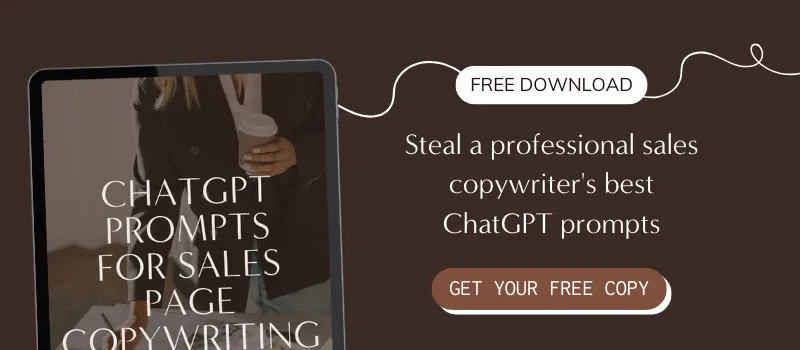
Sales Page Structure: What to Include for More Conversions
Convinced that you need a sales page? Awesome. You’re probably wondering what needs to go on it.
Let’s break down the essential ingredients every high-performing page needs. (You can also check out our full sales page structure guide for even more details.)
1. Write a headline that hooks ideal clients
This is your first impression. Your headline should quickly tell your reader what your offer is, who it’s for, and why they should keep reading. An idea client should be able to read your headline, know they’re in the right place, and be excited to keep reading.
2. Align your sales page copy with the buyer journey
If you walked into a store and someone immediately started selling to you, you'd be turned off. The same goes for your sales page. Instead of diving right into the pitch, meet your reader where they are. Speak to the challenges they’re facing, the obstacles that have been standing in their way, their desires around your offer, and gently guide them towards your solution.
3. Include a clear, compelling offer description
Clearly communicate what you’re offering and why it’s valuable. What transformation can someone expect on the other side of using your offer? Make it easy to understand — and hard to resist.
You’ll want to make sure that your sales page has a clear USP — unique selling proposition — and that a reader can quickly understand what’s included in your offer. Use bullet points or bolded text to highlight the key benefits and features.
4. Weave effective social proof throughout the sales page
Client testimonials, case studies, and even logos can help show a potential buyer that you’re a trusted business with a history of helping students or clients find success. Sprinkle these strategically throughout your page to backup any claims you’re making.
5. Include multiple call-to-actions (CTAs) throughout the page
Don't forget the most important part—telling your readers what to do next!
I recommend going beyond just dropping a simple “Buy Now” button at the bottom of your sales page. Instead, add multiple call to actions throughout your page so that people can say yes when they’ve gotten the information they need and are ready to buy.
6. Support your copy with an engaging sales page design
While I will always argue that copy is the most important part of your sales page, it also needs to be visually appealing if you want it to convert.
Make sure to keep things clean and organized, with clearly-laid-out sections. Use mockups to show people what they’re actually getting when they buy. And think about how you can break up the content so it’s easy to read.
Do You Need a Sales Page for Every Offer?
Telling you what you do or don’t need to run your online business isn’t my style, because every business (and every offer) is different. But for most offers, having a sales page really helps you make more sales.
If your offer is very low-cost (which is subjective based on your industry), already well-known, or primarily sold through personal outreach (like DMs or referrals), you might be able to get away with a simple checkout page.
But for most online business owners, a well-crafted sales page can be the difference between crickets and conversions.
Think of it this way: if someone doesn’t come to your website already knowing they want to buy, a sales page gives them the information, clarity, and confidence to make that decision.
So while you might not need a separate sales page for every tripwire offer or flash sale, it’s a smart move for any offer you want to sell consistently — without having to convince people 1:1.
Want to Write a Sales Page That Sells While You Sleep?
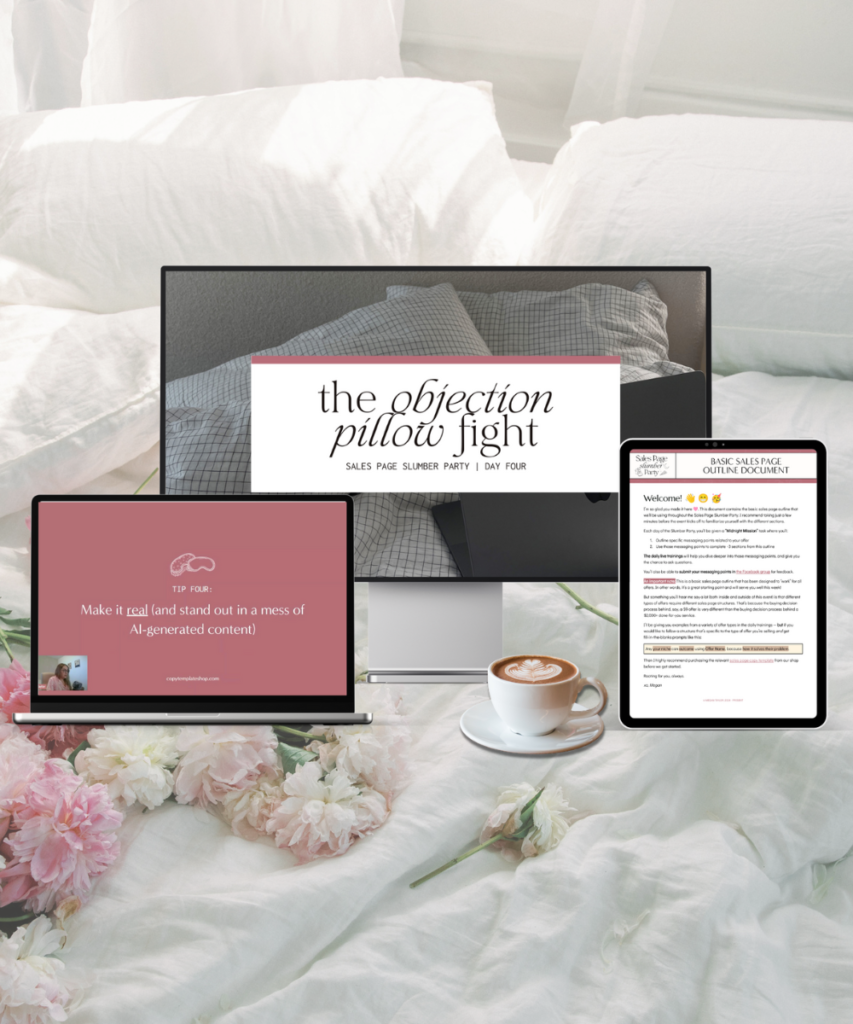
If you’re launching a new offer or creating a funnel, your sales page isn’t just nice to have — it’s a non-negotiable.
Without clear, connection-driven messaging on your page, even the best offers can get overlooked. But when your copy captures the right people’s attention and positions it as a total no-brainer to buy? That’s when the magic happens — even when you’re snoozing away!
Inside the Sales Page Slumber Party, I’ll walk you through how to write a high-converting sales page that works for you — day, night, and even during that mid-afternoon nap you totally deserve.
Final Sips: TL;DR Takeaways
- A sales page is your 24/7 salesperson — helping potential buyers understand your offer and why it’s right for them.
- It’s different from a landing page, which typically focuses on lead generation or awareness rather than conversion.
- A strong sales page is founded on messaging that meets your reader where they are, showcases your unique approach, and builds trust through social proof and clear CTAs.
- You might not need a sales page for every single offer — but if your offer is new, high-ticket, evergreen, or something you want to scale, a sales page is your secret weapon to more sales.
- Want help writing one? Join the Sales Page Slumber Party and I’ll walk you through it, step by step.
More Helpful Reads on Sales Pages
Want more tips to polish your page? Start with these:
6 Effective Sales Page Templates: Why Generic Doesn’t Cut It >
Sales Page Structure Secrets: A Guide for More Conversions >
Sales Page in a Day: Tips for Writing a Conversion-Driven Page >
Pin for later
